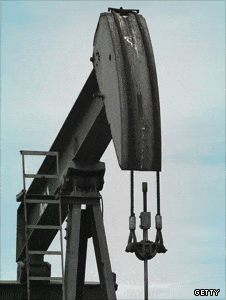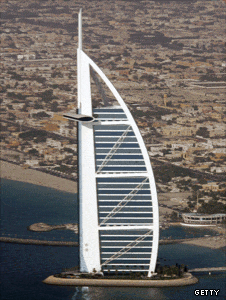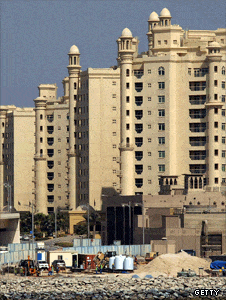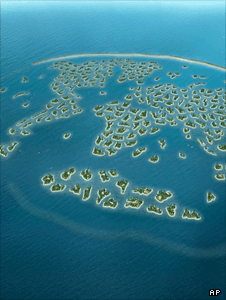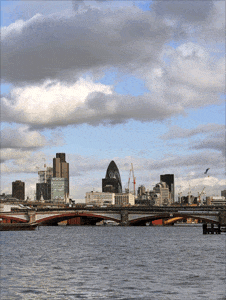BAK
JF-Expert Member
- Feb 11, 2007
- 124,789
- 288,011
Dubai under scrutiny after debt payment delay
BBC Business News

Dubai World has fuelled the emirate's rapid economic growth of recent years
Dubai's financial health has come under scrutiny after a major, government-owned investment company asked for a six-month delay on repaying its debts. Dubai World, which has total debts of $59bn (£35bn), is asking creditors if it can postpone its forthcoming payments until May next year.
Dubai World has also appointed global accountancy group Deloitte to help with its financial restructuring.
The company has been hit hard by the global credit crunch and recession.
It was due to repay $3.5bn of its debts next month.

 Put simply, everyone in the markets thought that, in the end, the federal government in Abu Dhabi would stand by all of Dubai's bad bets. Apparently, they won't.
Put simply, everyone in the markets thought that, in the end, the federal government in Abu Dhabi would stand by all of Dubai's bad bets. Apparently, they won't.

Stephanie Flanders, BBC economics editor

Dubai: Too big to fail?
The request for a delay in repayments led to major credit ratings agencies downgrading a number of state-backed companies.
Following six years of rapid growth, the Dubai economy has slumped since the second half of 2008.
This has led to Dubai property prices falling sharply.
'Shocking'
The Dubai government said in a statement that the request to delay debt repayments also applied to property developer Nakheel, a Dubai World subsidiary.
 ANALYSIS
ANALYSIS
Ben Thompson, business reporter, Dubai
Financial markets and businesses are closed here for the Eid holiday - some suggest that's why the announcement was made when it was.
It's sparked real shock that things have come to this. Just 12 months ago, few could have believed the city would find itself asking for this lifeline. It seems Dubai is now paying the price for living on borrowed money.
Of course, everyone knew the boom couldn't last forever, but no-one expected it to collapse when, or as suddenly, as it did. Property prices have more than halved over the past year and investors have fled.
The official figure for Dubai's debt is $80bn, but talk to anyone here and the feeling is the figure is much higher. Unpaid bills, abandoned cars and empty buildings are all too obvious. Some analysts put the real figure at close to $160bn.
"It's shocking because for the past few months the news coming out has given investors comfort that Dubai would most probably be able to meet its debt obligations," said analyst Shakeel Sarwar, of SICO Investment Bank.
Dubai is one of the seven self-governing emirates or states that make up the United Arab Emirates.
Analysts say the Dubai government has paid the price for a flamboyant economic model centred on foreign capital and giant construction projects.
Questions are now being raised about Dubai's ability to repay its debts, said the BBC's Middle East correspondent Jeremy Howell.
Some have speculated it is likely to turn to the more economically conservative Abu Dhabi emirate to bail it out.
Global credit rating agency Standard & Poor's, which rules on a company's or government's ability to repay its debts, said the announcement "may be considered a [debt] default".
Our correspondent said: "Standard & Poor's and Moodys immediately downgraded all six state-backed corporations in Dubai, downgrading some to junk status."
Junk is the term commonly used to describe bonds that are rated below investment grade by ratings agencies.
The Dubai World announcement was made on the eve of the Eid al-Adha Muslim festival, which will see many government agencies and companies close in Dubai until 6 December.
BBC Business News
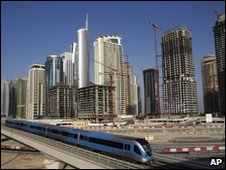
Dubai World has fuelled the emirate's rapid economic growth of recent years
Dubai's financial health has come under scrutiny after a major, government-owned investment company asked for a six-month delay on repaying its debts. Dubai World, which has total debts of $59bn (£35bn), is asking creditors if it can postpone its forthcoming payments until May next year.
Dubai World has also appointed global accountancy group Deloitte to help with its financial restructuring.
The company has been hit hard by the global credit crunch and recession.
It was due to repay $3.5bn of its debts next month.



Stephanie Flanders, BBC economics editor

Dubai: Too big to fail?
The request for a delay in repayments led to major credit ratings agencies downgrading a number of state-backed companies.
Following six years of rapid growth, the Dubai economy has slumped since the second half of 2008.
This has led to Dubai property prices falling sharply.
'Shocking'
The Dubai government said in a statement that the request to delay debt repayments also applied to property developer Nakheel, a Dubai World subsidiary.

Ben Thompson, business reporter, Dubai
Financial markets and businesses are closed here for the Eid holiday - some suggest that's why the announcement was made when it was.
It's sparked real shock that things have come to this. Just 12 months ago, few could have believed the city would find itself asking for this lifeline. It seems Dubai is now paying the price for living on borrowed money.
Of course, everyone knew the boom couldn't last forever, but no-one expected it to collapse when, or as suddenly, as it did. Property prices have more than halved over the past year and investors have fled.
The official figure for Dubai's debt is $80bn, but talk to anyone here and the feeling is the figure is much higher. Unpaid bills, abandoned cars and empty buildings are all too obvious. Some analysts put the real figure at close to $160bn.
"It's shocking because for the past few months the news coming out has given investors comfort that Dubai would most probably be able to meet its debt obligations," said analyst Shakeel Sarwar, of SICO Investment Bank.
Dubai is one of the seven self-governing emirates or states that make up the United Arab Emirates.
Analysts say the Dubai government has paid the price for a flamboyant economic model centred on foreign capital and giant construction projects.
Questions are now being raised about Dubai's ability to repay its debts, said the BBC's Middle East correspondent Jeremy Howell.
Some have speculated it is likely to turn to the more economically conservative Abu Dhabi emirate to bail it out.
Global credit rating agency Standard & Poor's, which rules on a company's or government's ability to repay its debts, said the announcement "may be considered a [debt] default".
Our correspondent said: "Standard & Poor's and Moodys immediately downgraded all six state-backed corporations in Dubai, downgrading some to junk status."
Junk is the term commonly used to describe bonds that are rated below investment grade by ratings agencies.
The Dubai World announcement was made on the eve of the Eid al-Adha Muslim festival, which will see many government agencies and companies close in Dubai until 6 December.
